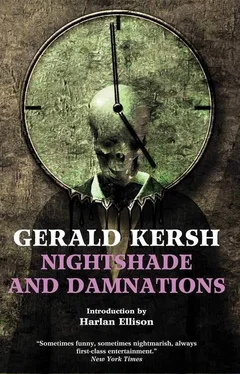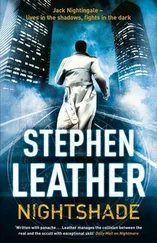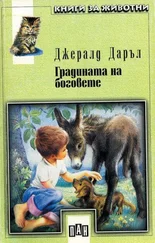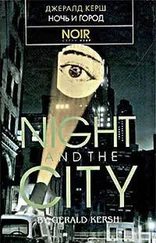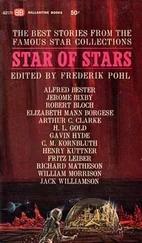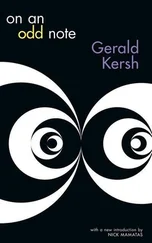Джералд Керш - Nightshade and Damnations
Здесь есть возможность читать онлайн «Джералд Керш - Nightshade and Damnations» весь текст электронной книги совершенно бесплатно (целиком полную версию без сокращений). В некоторых случаях можно слушать аудио, скачать через торрент в формате fb2 и присутствует краткое содержание. Город: Richmond, Год выпуска: 2013, Издательство: Valancourt Books, Жанр: Фантастика и фэнтези, на английском языке. Описание произведения, (предисловие) а так же отзывы посетителей доступны на портале библиотеки ЛибКат.
- Название:Nightshade and Damnations
- Автор:
- Издательство:Valancourt Books
- Жанр:
- Год:2013
- Город:Richmond
- ISBN:нет данных
- Рейтинг книги:3 / 5. Голосов: 1
-
Избранное:Добавить в избранное
- Отзывы:
-
Ваша оценка:
- 60
- 1
- 2
- 3
- 4
- 5
Nightshade and Damnations: краткое содержание, описание и аннотация
Предлагаем к чтению аннотацию, описание, краткое содержание или предисловие (зависит от того, что написал сам автор книги «Nightshade and Damnations»). Если вы не нашли необходимую информацию о книге — напишите в комментариях, мы постараемся отыскать её.
Nightshade and Damnations — читать онлайн бесплатно полную книгу (весь текст) целиком
Ниже представлен текст книги, разбитый по страницам. Система сохранения места последней прочитанной страницы, позволяет с удобством читать онлайн бесплатно книгу «Nightshade and Damnations», без необходимости каждый раз заново искать на чём Вы остановились. Поставьте закладку, и сможете в любой момент перейти на страницу, на которой закончили чтение.
Интервал:
Закладка:
The fifth rung broke, and I fell.
I remember that I saw a great white light—then a great dark. Later—I do not know how much later—I opened my eyes. I knew that I was alive, because I felt pain. But I was not lying where I had fallen. I could see no circle of daylight such as I had seen in falling, at the mouth of the manhole. There was nothing to be seen: I was in the dark. And I could hear odd little glottal voices.
“Water!” I said.
“Ah-awa,” said a thin, whining voice. Something that felt like a cracked earthenware saucer was pressed against my lips. It contained a spoonful or two of cold water; half a mouthful. The cracked earthenware saucer was taken away empty and brought back full. I took hold of it, to steady it.
It was a little cupped hand, a live hand.
I knew then that I had fallen down into the underground world of the little people that haunt the desolate ruin called Annan, or The Bad Place. I was in fairyland. But my right leg was broken. My flashlight was broken, and I was in the dark.
There was nothing to be done. I could only lie still.
The little people squatted around me in a circle. One high, ecstatic, piping voice began to sing:
Ookil’ karabin,
Ookil’ karabin!
Thirty or forty voices screeched:—
Isapara mibanara,
Ikil’ karabin!
Then, abruptly, the singing stopped. Something was coming. These little people knew the art of making fire, and understood the use of light. One of them was holding a tiny vessel, in which flickered a dim, spluttering flame no larger than a baby’s fingernail. It was not what we would call illumination. It was better than darkness, it permitted one to see, at least, a shadow. You will never know the comfort that I found in that tiny flame. I wept for joy. My sobbing jolted my broken leg, and I must have fainted. I was a wounded man, remember. Shivering in a wet cold that came from me and not from the place in which I lay, I felt myself rising in waves of nausea out of a horrible emptiness.
The little people had gone, all but one. The one that stayed had my elastic plaster on his left wrist. His right hand was cupped, and it held water, which I drank. Then he made a vague gesture in the direction of my pockets—he wanted chocolate. I saw this in the light of the little lamp, which still flickered. His shadow danced; he looked like a rat waltzing with a ghost. I had some chocolate in my pocket, and gave him a little. The light was dying. I pointed at it with a forefinger and gesticulated up , up , up with my hands.
He ran away and came back with another lamp.
I can tell you now that the oil that feeds those little lamps is animal fat—the fat of rats. The wicks of the lamps are made of twisted rat-hair. The little men of Annan have cultivated rats, since they went underground. There are hereditary rat-herds, just as there used to be hereditary shepherds and swine-herds. I have learned something—not much—of the habits of the little men of the dust in Annan. They dress in rat-skin clothes and have scraped out runs, or burrows, which extend for miles to the thirty-two points of the compass. They have no government and no leaders. They are sickly people. They are perishing.
Yet they are men of a sort. They have fire, although they cannot tolerate the glare of honest daylight. They have—like all of their kind—a buried treasure of useless coins. They have the vestiges of a language, but they are always cold. The poor creature whose wrist I broke had wanted my woolen jacket; now I gave it to him, and he wept for joy. They cultivated fungi—which I have eaten, not without relish—augment their diet of the rank meat which they get by butchering the gray creatures that provide them with food, fat, and fur. But they are always hungry. The rats are getting slower and less reliable in their breeding: the herds are thinning out.
My little man kept me supplied with meat and water. In the end I began to understand the meaning of his whispering and snuffling underworld language. This fairy, this man of the dust of Annan, was kind to me in his way. He adored me as a fallen god. Sometimes, when I raved and wept in delirium, he ran away. But he always came back. My leg was throbbing. I knew that infection was taking hold of the wound, and began to lose hope down in the dark. I tried to detach my mind from the miserable condition of my body. I listened to the strange songs of the rat-people. It was through the chant Balasamo that I learned their language. It came to me in a flash of revelation as I lay listening, Balasamo , Balasamo . . . The tune wove in and out. It gave me no peace. I had heard something like it at home. Doctor Opel had been lecturing on ancient music. . . .
Suddenly I understood. I remembered.
Balasamo,
Balasamo,
Sarnacorpano!
This was a song five hundred years old. It used to be a marching song during World Wars I, II and III. The words, which time had corrupted and misery debased, should have been:
Bless ’em all,
Bless ’em all,
Sergeants and Corporals and all!
There’ll be no promotion
This side of the ocean
So cheer up my lads, bless ’em all!
Similarly, Ookil ’ karabin meant Who Killed Cock Robin .
And, of course, Annan came down, whine by whine, through Unnon and Lunnon from London! The little people spoke archaic English. I could see, then, something of their melancholy history. I could see the proud city dwellers going down to become shelter dwellers at the outbreak of the Atom War, The Ten Minute War of 19 . . . , 19 . . . . I forget the exact date . . . My head is swimming . . . My little rat-man watches me with terrified eyes. Somewhere his people are singing . . . But the light is dying, and so am I. . . .
WHATEVER HAPPENED TO CORPORAL CUCKOO?
Several thousand officers and privates of the U. S. Army who fought in Europe in World War II can bear witness to certain basic facts in this otherwise incredible story.
Let me refresh my witnesses’ memories:
The Cunard White Star liner the Queen Mary sailed from Greenock, at the mouth of the river Clyde, on July 6th, 1945, bound for New York, packed tight with passengers. No one who made that voyage can have forgotten it: there were fourteen thousand men on board, a few ladies, and one dog. The dog was a gentle, intelligent German shepherd, saved from slow and painful death by a young American officer in Holland. I was told that this brave animal, exhausted, and weak with hunger, had tried to jump over a high barbed wire fence, and had got caught in the barbs on the top strand, where it hung for days, unable to go forward or backward. The young officer helped it down, and so the dog fell in love with the man, and the man fell in love with the dog. Pets are not allowed on troopships. Still, the young officer managed to get his dog on board. Rumor has it that his entire company swore that they would not return to the United States without the dog, so that the authorities were persuaded to stretch a point, just for once: this is what Kipling meant when he referred to the power of the dog. Everyone who sailed on the Queen Mary from Greenock on July 6, 1945 remembers that dog. It came aboard in a deplorable state, arching its bedraggled back to ease its poor injured stomach, and when you stroked it, you felt its skeleton under the sickly, staring coat. After about three days of affectionate care—half a hundred strong, hungry men begged or stole bits of meat for its sake—the dog began to recover. By July 11, when the Queen Mary docked in New York, the dog was taking a dog’s interest in a soft rubber ball with which several officers were playing on the sun deck.
Читать дальшеИнтервал:
Закладка:
Похожие книги на «Nightshade and Damnations»
Представляем Вашему вниманию похожие книги на «Nightshade and Damnations» списком для выбора. Мы отобрали схожую по названию и смыслу литературу в надежде предоставить читателям больше вариантов отыскать новые, интересные, ещё непрочитанные произведения.
Обсуждение, отзывы о книге «Nightshade and Damnations» и просто собственные мнения читателей. Оставьте ваши комментарии, напишите, что Вы думаете о произведении, его смысле или главных героях. Укажите что конкретно понравилось, а что нет, и почему Вы так считаете.
